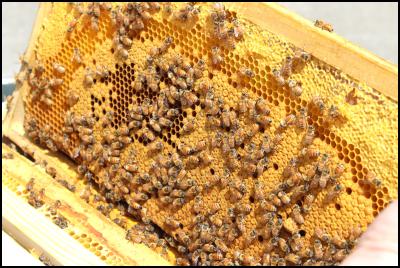Bees accept CPIT hospitality
Bees accept CPIT hospitality

CPIT’s School of Food and Hospitality will extend a warm welcome to thousands of bees tomorrow and tutor David Spice hopes the school’s new beekeeping initiative will inspire other Christchurch businesses to offer their rooftops to bees too.
“We are the garden city and at CPIT we are right on the doorstep of the proposed green frame. We need bees to help us maintain the environmental health of the city,” he said.
Spice, a registered bee keeper, has placed an initial
two hives on the Food and Hospitality School roof which will
be opened tomorrow The multi-floral honey harvested from
next year will be sold in the Pantry café on campus and the
hives will be used as teaching tool as well as a way to
contribute to Christchurch’s environmental health.
Bees’ importance to sustainability in Christchurch and
globally cannot be underestimated, Spice said.
“No bees, no pollination, no food. It’s that simple. Our food system and our ecosystem rely heavily on bees. A lot of hives were wiped out by the earthquakes, such as the ones on the Science Alive building; they have gone. However, Christchurch has continuous flowering that can sustain bees, so I am hoping other businesses will see what we are doing and we can put hives on their roofs too.
“Bees are amazing and this is a good way for our students to learn about them – how important they are to the food chain, how honey is harvested and how to care for bees as well,” he said.
Spice has been practising his beekeeping skills on hives at his home for the last year. He has learned how to keep the Queen bees happy, how bees navigate their way back to the hive (inbuilt GPS) and what harvest yields might be (based on about a dessertspoon of honey per year for each worker bee). Spice is willing to establish hives on other rooftops - all that is required is a little flat roof space and a taste for honey and he will do the rest.
Bee numbers have declined internationally due to diseases such as the varroa mite and American foulbrood, and are in shortage worldwide.
Dennis Walker, CPIT School of Food and Hospitality Manager, is delighted that CPIT’s beehive initiative will allow the school to contribute to sustainability in Christchurch and also produce food at the school. “This sort of initiative is typical of our tutors who consistently contribute to community wellbeing in different ways, from cooking big charity dinners to helping cook hangi at CPIT and now beekeeping.”
ends


 Royal Commission Covid-19 Lessons Learned: Public Submissions To The COVID-19 Inquiry Close On Sunday 27 April 2025 At Midnight
Royal Commission Covid-19 Lessons Learned: Public Submissions To The COVID-19 Inquiry Close On Sunday 27 April 2025 At Midnight Te Whatu Ora Health New Zealand: Low Risk To Public Health Following Fire At South Taranaki Hotel
Te Whatu Ora Health New Zealand: Low Risk To Public Health Following Fire At South Taranaki Hotel NZCTU: Govt Vocational Education Reforms Will Cause Massive Disruption
NZCTU: Govt Vocational Education Reforms Will Cause Massive Disruption NZ Liberation Museum - Te Arawhata: Anzac Day Commemorations In France To Remember All New Zealand Soldiers
NZ Liberation Museum - Te Arawhata: Anzac Day Commemorations In France To Remember All New Zealand Soldiers Royal Commission Covid-19 Lessons Learned: We Want To Hear From As Many People As Possible, Says COVID-19 Inquiry Chair
Royal Commission Covid-19 Lessons Learned: We Want To Hear From As Many People As Possible, Says COVID-19 Inquiry Chair My ECE: Parents Reject ECE Deregulation - 'Children’s Safety Is Not Optional'
My ECE: Parents Reject ECE Deregulation - 'Children’s Safety Is Not Optional'